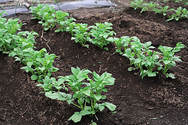|
Ozark Green Thumb BCMG Monthly e-Newsletter |
|
|
 Winter is a good time to start planning your spring vegetable garden. These are some things to consider. Many factors should be considered when selecting the garden site. The size of the garden is determined by the available space, the number of members in the family and how the vegetables will be used. Sunlight is essential to plant growth. Vegetables should receive a minimum of six hours of direct sunlight during the day. Tomatoes, corn, peppers, cucumbers, root crops and melons need full sunlight. Some of the leafy vegetables like cabbage, broccoli and cauliflower will tolerate more shade. The roots of trees, large shrubs and hedges compete with vegetables for nutrients and moisture. Additional plant food and extra water help compensate for this competition but will not relieve shade problems. Surface drainage of excessive rains is desirable. Using slightly sloping areas helps, and areas that are more sloped may be used if managed properly. Contour the rows to the shape of the slope (plant around the hill). You can construct terraces or raised beds if the slope is too steep. A soil test can make the difference between success and failure in the garden. Soil testing is a free service provided by the Cooperative Extension Service and the Soil Testing Laboratory. Soil tests are desirable to determine the pH level and the amount of nitrogen, phosphorus, potassium and calcium in the garden’s soil. They are helpful if the samples are taken properly and the recommendations followed. Your county Extension office has instructions and containers for submitting the samples. The pH of the soil can be adjusted to make sure that soil nutrients are available. Most native soils in Arkansas are acidic and need to be amended with lime to raise the soil pH. The vegetable garden should be slightly acidic with a pH level ranging from 5.8 to 6.8. Lime takes 6 to 8 weeks to alter soil pH and should be applied in the fall or late winter. Agricultural lime has a mix of particle sizes and will provide long term control of soil pH. Pelletized or lawn lime has very fine particles and reacts over a much shorter period of time but needs to be reapplied annually. Reduce the recommended rate if using pelletized lime. Liming the soil makes nutrients available to the plants especially calcium. Gypsum can be added to increase calcium if the soil pH does not need to be raised by lime. Plant perennial crops such as asparagus and strawberries over to the side of the garden since they will remain in the same area for many years.
Put all tall growing crops together where they don't shade out low growing crops. Follow quick growing, early spring crops with warm season crops during the late spring and summer
0 Comments
Leave a Reply. |
Archives
April 2022
|
|
